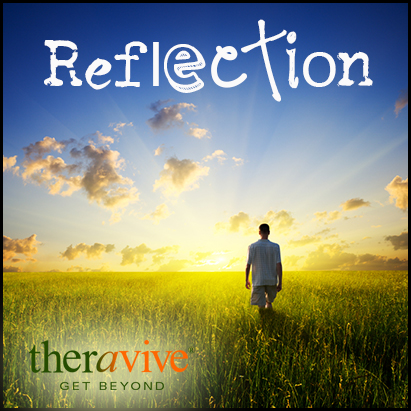 "What are you afraid would happen if you weren't worried?" - Kaufman
"What are you afraid would happen if you weren't worried?" - Kaufman
What is reflection? Reflection means taking time to think in a relaxed, unhurried way about ourselves, our lives and important issues. So often we do our thinking in circumstances where we feel pressured to find instant solutions and conclusions. Reflection is a slower, deeper, less structured form of thinking that is not aimed at providing quick answers. Thus, it is one good way to increase our self-awareness. Reflection can be particularly useful when we are trying to sort out the complex questions, feelings, problems and challenges we face from time to time. (Psychology foundation.org)
In The Book called "Giant Steps", Barry Kaufman is a psychologist that gives us examples of how to effectively use questions to reflect on important issues. Within the book are a series of case studies in which he describes his reflections on some of the people that he has worked with. I believe that reading and studying what others have done is a great way to learn how to ask reflective questions both to yourself and to others.
In my experience, reflection is one of the most important parts of being a good counselor, therapist, psychotherapist, and psychiatrist. We should be using this method of understanding each and every time we step in with our clients to find an understanding of their lives and to better create a map of what is happening and possible ideas and solutions to match.
 A GPS System
A GPS System
Within reflection lies our values and beliefs on how we should proceed. We can look at values and beliefs as a GPS system that asks us things like, are you sure you want to take that exit, are you wanting to go around that corner, or would you like to reroute and try a different way, it may take longer but what if there is less traffic? Sometimes these signals are confused and mixed up and needing to be unraveled so we can clearly define our options and align ourselves once again in the direction we want to go.
This book was significant to me for a number of reasons. One reason was that I was given it to read and borrow from a very well-respected youth worker named Tom. I was hired at an “alternative” school to do, as some people referred to as, “the deep and heavy work that has peoples lived in your hands”. No pressure right? Well, I quickly came to know the youth workers who, in my opinion, played the most critical role in the young peoples lives. They were the gate keepers, the counsellors, the crisis workers, the mediators, the advocates, and always sought to go above and beyond to keep young people as healthy both emotionally and physically as possible. Tom was no exception. He brought with him a youthfulness that came from deep within his soul and he is the type of person that is joyful and laughing yet when you sit down with him he can look into your eyes and ask the hard questions that I know not many other people would do. Tom is also very open about his own life and his own stories and experiences which is often something workers and people in the social services field hold back on sharing for fear of being accused of not being professional. Tom, however, is everything professional is supposed to be and more. He holds the stories of youth that he works with gently in his hands and as if they were a sacred and precious stone. For this reason I looked at the book he offered me as having insight and I was interested to see what I would find within it.
With a critical analysis each and every case study that Kaufman provides, there are some common themes in creating understanding before even asking any reflection questions. One of these themes revolve around the deep caring and connection that he has to clients that most likely we would not see through reading a book but if we were sitting in front of him we would feel it inside of our body. From here we begin reflection. A question that we can often ask ourselves as we are going to be with our clients is how are we presenting ourselves? What will the other person feel from how we are? How we walk, how we greet each other, and how we connect?
Digging Deeper
These surface reflection questions are the beginning for something deeper. What often lies underneath is our fears and worries about what will happen if we reflect to deeply, which keep us from being who we want to be. I believe that Barry Kaufmann and Tom would say that it was not our fault that there were things in our lives that influenced how we are and that it was important for others to help bring us out of our difficulties and challenges.
When we are thinking about our own personal challenges a question that can be asked is who supports us? Who would be able to see our true selves even if we cannot? It may be our family, our friends, our coworkers, but whoever it is, we cannot do it alone. Without reflection sometimes our fears and worries turn into a beast of its own. We are now afraid of our own fear. My goal is to kick fear and worry to the side and let our true self-shine. Thank you Tom and Barry for being people that help us do this.
________________________________________________________________________________________________________________________________
Cristina works in Abbotsford BC and is the creator of both Shamrock Counselling Services (www.shamrockcounselling.com ) & Sundance Solace Society (www.sundancesolace.com). Sundance Solace is a non-profit branch that focuses on the power of nature to benefit people. If you would like to be involved there are a number of opportunities including: professional and practicum internships, associate positions, and volunteering. Please contact Cristina for more information
By Cristina Rennie MA, RCC, CEIP – MH
www.shamrockcounselling.com
shamrockcounselling.cristina@gmail.com
604 751 2354
opportunities by engaging with the need for awareness and fairness"
About the Author

Shamrock Counselling
, MA, RCC, CBEIP, NAEFWShamrock Counselling specializes in a unique style of counselling known as Equine Facilitated Counselling. Clients have the opportunity to work alongside horses in a safe, open and outdoor environment. In addition to Equine Facilitated Counselling, Shamrock Counselling also offers Traditional Counselling at their second location in the heart of Downtown Abbotsford. Shamrock Counselling is made of a team of qualified counsellors with specialization in a large range of different areas.
Office Location:
31050 Harris Rd.
Abbotsford, British Columbia
V4X 1W2
Canada
Phone: 604-751-2354
Contact Shamrock Counselling
Professional Website:
www.shamrockcounselling.com